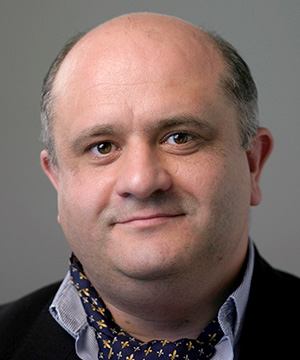
Photo by Ryszard Waniek/Fotorzepa
New people, not necessarily well educated or sensitive enough, begin to work as journalists. To add insult to injury, people can post whatever they please on the Internet.
In conversation with Jerzy Haszczyński, Head of the Foreign Desk at the “Rzeczpospolita” daily.
Over ten years ago, you and the “Rzeczpospolita” daily started a campaign to eliminate the term “Polish death camps”, which often crops up in the foreign media. Roughly at the same time, the Polish diplomatic service started to respond to each usage of the term in politics or journalism. Has anything changed since then?
The most recognised titles use the term such as “Polish death camps” much less frequently than before. In the United States, a media market that is key to the assessment of the World War II legacy, the usage of the phrase is prohibited in the journalistic manuals in many newspapers and the Associated Press, which is the world’s largest press agency.
However, this does not mean that the term has disappeared completely. These words do crop up from time to time. New people, not necessarily well educated or sensitive enough, begin to work as journalists. To add insult to injury, people can post whatever they please on the Internet. Some people defend the usage of this mendacious phrase by saying that “Polish” refers to the geographical coordinates only. However, if you have a minimum awareness of what happened during World War II and aspire to be a serious journalist, you will never use phrases as ridiculous as “Polish camps”. After all, nobody says Guantanamo is a Cuban prison.
So why people started to call the German camps Polish?
When the global debate on the World War II legacy was reaching its conclusion, Poland was still under Communist rule and her voice remained barely audible. We entered this market of ideas in the 1990s, when all the cards had been dealt already. Additionally, Poland’s reaction was far from impressive. It was not until the beginning of the 21st century and the emergence of both the Internet and faster access to the global media that we were able to realise the issue’s gravity.
Germany has never made a similar mistake.
Right from the outset they were very keen to improve their publicity. Their success is due to effective policies and millions of German marks spent on the country’s promotion. Additionally, Hollywood productions such as Schindler’s List have also driven a message that not all the Germans were bad. Some people began to speculate that the Germans could not be held responsible for everything and that other people were also complicit in their doings. People ceased to call the perpetrators of the genocide German, and the stateless and nationless Nazis came onto the scene. Germany began to disappear from historical accounts, and “Polish camps” were soon to be embraced by the media.
How can we drive our point home to the international public that the camps were not Polish?
The best and most successful way is through mass culture. It is worth creating a feature film or TV series that would attract large audiences. Take Turkish historical TV serials for example or the German series Generation War, which was purchased by TV stations in somewhere about 100 different countries. This is a very difficult task to do, however. To date, the Polish films that straighten the historical wrongs have been far from successful. The officials and politicians are not able to create a motion picture that speaks to global audiences. We need a new Spielberg to do this.



